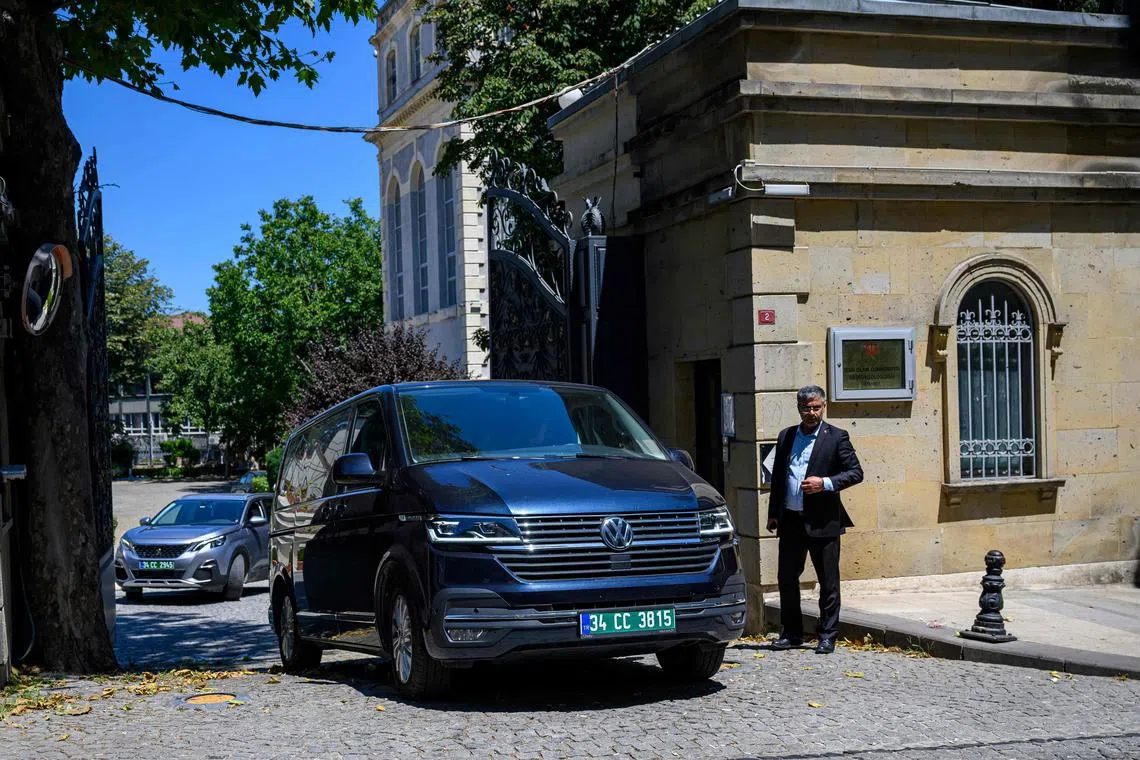Iran says it held ‘frank and detailed’ nuclear talks with European powers
Sign up now: Get ST's newsletters delivered to your inbox

A European delegation leaving the Iranian consulate in Istanbul, Turkey, following nuclear talks on July 25.
PHOTO: AFP
Follow topic:
- Iran and E3 diplomats held "frank and detailed" talks in Istanbul, discussing uranium enrichment and UN inspector cooperation.
- E3 powers threatened to trigger the "snapback mechanism," reinstating UN sanctions due to stalled negotiations.
- Iran warned that triggering sanctions would be "completely illegal" and criticised the European stance, raising tensions further.
AI generated
ISTANBUL – Iranian diplomats said they held “frank and detailed” nuclear talks on July 25 with counterparts from Germany, Britain and France, which have threatened to trigger sanctions if Tehran fails to agree to a deal on uranium enrichment and cooperation with UN inspectors.
The meeting in Istanbul, Turkey, was the first since Israel launched an attack on Iran a 12-day war
The European diplomats were seen leaving the Iranian consulate shortly before 1100 GMT (7pm in Singapore) after spending several hours inside.
Israel’s offensive – which killed top commanders, nuclear scientists and hundreds of others and in which residential areas and military sites were struck – also derailed US-Iran nuclear talks that began in April.
Since then, the European powers, known as the E3, have threatened to trigger a so-called “snapback mechanism” under a moribund 2015 nuclear deal that would reinstate UN sanctions on Iran by the end of August.
The sanctions trigger expires in October, and Tehran has warned of consequences
Iran’s Deputy Foreign Minister Kazem Gharibabadi, who attended the talks alongside senior Iranian diplomat Majid Takht-Ravanchi, wrote on X that he had used the meeting to criticise the European stance on the 12-day conflict with Israel.
He said the snapback mechanism had also been discussed, adding: “It was agreed that consultations on this matter will continue.”
Mr Takht-Ravanchi told state news agency IRNA that the Iranian side had demanded “punitive sanctions” be lifted “as soon as possible”.
Before the talks, a European source said the three countries were preparing to trigger the mechanism “in the absence of a negotiated solution”.
The source urged Iran to make “clear gestures” on uranium enrichment and resuming cooperation with the IAEA.
‘Common ground’
Mr Gharibabadi warned earlier in the week that triggering sanctions – which would deepen Iran’s international isolation and place further pressure on its already strained economy – would be “completely illegal”.
He accused European powers of “halting their commitments” under the 2015 deal, which the US unilaterally withdrew from in 2018 during US President Donald Trump’s first term.
“We have warned them of the risks, but we are still seeking common ground to manage the situation,” said Mr Gharibabadi.
Iranian diplomats have previously warned that Tehran could withdraw from the global nuclear non-proliferation treaty if sanctions were reimposed.
Israeli Foreign Minister Gideon Saar has urged European powers to trigger the mechanism.
Israel’s June 13 attack on Iran came two days before Tehran and Washington were scheduled to meet for a sixth round of nuclear negotiations.
On June 22, the US joined Israel’s offensive by striking Iranian nuclear facilities
Before the war, the US and Iran were divided over uranium enrichment – with Tehran describing it as a “non-negotiable” right, while Washington called it a “red line”.
The IAEA says Iran is enriching uranium to 60 per cent purity – far above the 3.67 per cent cap under the 2015 deal and close to weapons-grade levels.
Tehran has said it is open to discussing the rate and level of enrichment, but not the right to enrich uranium.
A year after the US withdrew from the nuclear deal, Iran began rolling back its commitments, which had placed restrictions on its nuclear activities in exchange for sanctions relief.
Israel and Western powers accuse Iran of pursuing nuclear weapons, a charge Tehran has repeatedly denied.
‘New form’
Iran insists it will not abandon
Though he claimed enrichment had come to a halt because of “serious and severe” damage to nuclear sites caused by US and Israeli strikes, the full extent of the damage sustained in the US bombing remains unclear.
Mr Trump claimed at the time the sites had been “completely destroyed”, but US media reports based on Pentagon assessments cast doubt on the scale of destruction
Since the 12-day war, Iran has suspended cooperation
Inspectors have since left the country but a technical team is expected to return in the coming weeks after Iran said future cooperation would take a “new form”.
Israel has warned it may resume strikes if Iran rebuilds facilities or moves toward weapons capability.
Iran has pledged a “harsh response” to any future attacks. AFP

